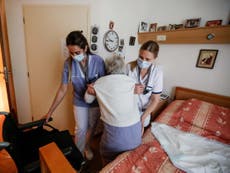Coronavirus: New lockdown care home visit guidance in England likened to ‘prison systems'
‘It can’t be assumed that care homes have the resource, space and time to put in place some of the suggested options’

Your support helps us to tell the story
From reproductive rights to climate change to Big Tech, The Independent is on the ground when the story is developing. Whether it's investigating the financials of Elon Musk's pro-Trump PAC or producing our latest documentary, 'The A Word', which shines a light on the American women fighting for reproductive rights, we know how important it is to parse out the facts from the messaging.
At such a critical moment in US history, we need reporters on the ground. Your donation allows us to keep sending journalists to speak to both sides of the story.
The Independent is trusted by Americans across the entire political spectrum. And unlike many other quality news outlets, we choose not to lock Americans out of our reporting and analysis with paywalls. We believe quality journalism should be available to everyone, paid for by those who can afford it.
Your support makes all the difference.Government guidance issued to facilitate Covid-secure visits during England’s lockdown have been likened to “prison visitation” systems, as one major organisation criticised ministers for “missing the mark” and warned lives could be put at risk.
The remarks from charities and care home providers came after Matt Hancock, the health secretary, announced that limited visits to residences could take place during November in a departure from the sweeping ban during the first wave of the pandemic.
The official guidance, published today, says that visitor numbers should be limited to a “single constant visitor” wherever possible and an “absolute maximum of two constant visitors” per resident with appropriate Personal Protective Equipment (PPE) used at all times.
The Department for Health suggested care homes should use “visiting pods”, rooms that can be directly accessed from outdoors, such as a conservatory, and said visits can take place at windows.
They added: “Visits should happen in the open air wherever possible, recognising that for many residents and indeed visitors this will not be appropriate in the winter (this might include under a cover such as an awning, gazebo, open-sided marquee etc).”
The guidance also urges those visiting should follow social distancing rules and spaces designated for visiting must also be used by only one resident and visiting family member at any one time.
Before visits, the care home should ensure appointments have been booked and that “ad hoc visits should not be enabled”.
In the event of an outbreak at a residence, all visits must be stopped until infection is brought under control, except in exceptional circumstances, such as end of life visits, the document added.
Kate Lee, the chief executive officer at Alzheimer’s Society, said the government guidance was “still missing the mark”, adding: “This guidance will also put lives at risk. It can’t be assumed that care homes have the resource, space and time to put in place some of the suggested options, and which have the potential to cause distress to people with dementia, particularly those in the later stages.
“During the four months of the first lockdown, we saw an unexpected rise in dementia deaths in care homes that were not coronavirus related – we believe these 5,000 additional deaths could be as a result of disruptions to a threadbare social care system, and prolonged social isolation, causing dementia symptoms to rapidly deteriorate.”
Ms Lee also said the organisation was “disappointed” the government had not designated family carers key worker status access to PPE and regular testing.
“It’s essential for meaningful contact, which you just can’t get through a piece of glass, to provide care safely and to limit the spread of the virus – anything less is completely unacceptable,” she said.
Erica Lockhart, the CEO of Surrey Care Association, said every single home takes visitation “extremely seriously”, but added: “The guidance, which outlines measures likened to prison visitation systems, suggests floor to ceiling screens, and whilst I can understand the government’s suggestion they haven’t fully understood the impact this will have on residents and loved ones.”
The department said on Wednesday it had plans to allow specific family and friends to visit care homes supported by testing will be trialled later this month in England, but provisions are not expected to be in place during the November lockdown.
Earlier, Sam Monaghan, the chief executive of charity care provider MHA, said routine testing for regular visits would be the best way to facilitate face-to-face contact.
He told the BBC Radio 4’s Today programme: “The challenge we’ve got is we are seeing and experiencing every day the toll of the separation between resident and families.
“We are trying to balance the emotional and mental health wellbeing of our residents with the call, quite clearly, to protect some of the most vulnerable people in our society from the ravages of Covid-19. We need the government to really take hold of that testing agenda.”
In a statement on Wednesday, Mr Hancock said: “I know how heartbreaking and incredibly frustrating it has been for families and friends who haven’t been able to see their loved ones during the pandemic.
“Care homes should feel empowered by this new guidance to look at safe options to allow visits to care homes that suit their residents and facilities. We’ve seen some really innovative solutions used to help families see each other safely, face-to-face, which has been life-changing for some.
“It is vital high quality, compassionate care and infection control remains at the heart of every single care home to protect staff and residents’ lives, but we must also families to reunite in the safest possible way.”




Join our commenting forum
Join thought-provoking conversations, follow other Independent readers and see their replies
Comments